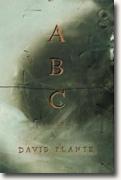ABC
David Plante
book reviews:
· general fiction
· chick lit/romance
· sci-fi/fantasy
· graphic novels
· nonfiction
· audio books
· author interviews
· children's books @
curledupkids.com
· DVD reviews @
curledupdvd.com
newsletter
win books
buy online
links
home
for authors
& publishers
for reviewers

 |
ABC David Plante Pantheon Hardcover 272 pages August 2007 |
|
University professor Gerard Chauvin, his wife, Peggy, and their six-year-old son, Harry, are drawn to the adventure of exploring an abandoned house on the edges of a picaresque lake in New England. With its screens torn, timbers rotting, and stones that have recently fallen off the crumbling concrete, there's something about the profound stillness surrounding the house that attracts the three of them to look inside.
Gerald tries to temper the tragedy that took Harry with an urgency to connect to the sheet of paper with the bizarre script. When a colleague reveals that the alphabet on the paper is in fact Sanskrit written over and over, Gerard, for reasons that he cannot explain, is further drawn to this incomprehensible piece of writing. But how did a page of Sanskrit letters get into an abandoned house? More importantly, who had actually gone into the house to practice the script and left the page atop the fireplace? While Peggy silently drifts away, seeking comfort with her best friend, Gerard, consumed with grief and now on crutches, resumes his teaching job. Intent to search for clues to the mysterious script, he returns to the house in the winter in an effort to find out who owned it. It is only when Gerard meets a young woman and her teenage son living in a trailer next door does he discover that the house has lain empty for years. When a girl from a neighboring camp gives him an old, damp-smelling copy of the Bhagavad Gita, Gerard becomes ever more steadily caught up in a wave of obsession and is prompted to uncover anything substantial about the modern alphabet and why it is organized the way it is. With the arrangement made so far back in time, surely someone, somewhere, must have set out the letters in an order that has survived until now. Gerard's search eventually takes him to Boston where he meets Catherine, a British-Chinese woman who is also searching for the history of the alphabet. With the death of her daughter, Susan, continuing to haunt her, Catherine has come to Boston from London to see the grave of the girl Susan was named after. Mutually united by tragedy, Gerard decides to travel to England with Catherine, both of them connected by the shared impulse to find out something significant about the alphabet. Eventually Gerard and Catherine seek knowledge from acclaimed Kings College philologist Charles Craig, who mesmerizes them with his own version of the origins of the letters and the histories of the various languages of the world. At the same time, they meet David, a brokenhearted and despondent young man who has recently lost his wife to terrorism and who has come from Athens expressly to see Craig. Moving from America to the United Kingdom then on to Greece for the final mind-bending historical revelations, this novel shows how three people united in sorrow explore the connections we have with the origins of our histories. Incorporating an exhilarating concoction of ancient literature, history and philosophy, author David Plante weaves throughout his novel the universal themes of grief and loss. Gerard, Catherine and David's journey certainly encompasses a sense of unreality, just as grief and the ghosts of the dead are always in their midst, no matter where they travel to. Even later on in the novel when they land in Athens, the dead are along the streets, raising their ghostly hands, heralding the arrival of these "three death-obsessed and death-bound friends." In the end, it is the dead who speak to them in unexpected turns, and the dead whom they need as much as the dead need them. Psychologically complex and intellectually substantial, Plante also weaves together his very palpable ideas about philology, the very "love of words," into a tale that questions the authority and dominance of the written alphabet throughout history. More significantly, the novel is also about where we stand and our place in the collective connections of a world that continues to exist within a constantly changing universe. Originally published on Curled Up With A Good Book at www.curledup.com. © Michael Leonard, 2007 |
|
|
|
 Click here to learn more about this month's sponsor! |
|
| fiction · sf/f · comic books · nonfiction · audio newsletter · free book contest · buy books online review index · links · · authors & publishers reviewers |
|
| site by ELBO Computing Resources, Inc. | |
 In the midst of all of the broken furniture lies a large stone fireplace
whose mantel is covered with beer and whisky bottles, on top of which lies a heap of crumpled papers torn from a notebook with a sheet of writing that looks like a script
bearing carefully drawn letters. Just as Gerard puts the piece of paper in his pocket, he turns to see the astonishment on Harry's face as his son disappears before him, all the way to the concrete floor of the basement ten feet down.
In the midst of all of the broken furniture lies a large stone fireplace
whose mantel is covered with beer and whisky bottles, on top of which lies a heap of crumpled papers torn from a notebook with a sheet of writing that looks like a script
bearing carefully drawn letters. Just as Gerard puts the piece of paper in his pocket, he turns to see the astonishment on Harry's face as his son disappears before him, all the way to the concrete floor of the basement ten feet down.